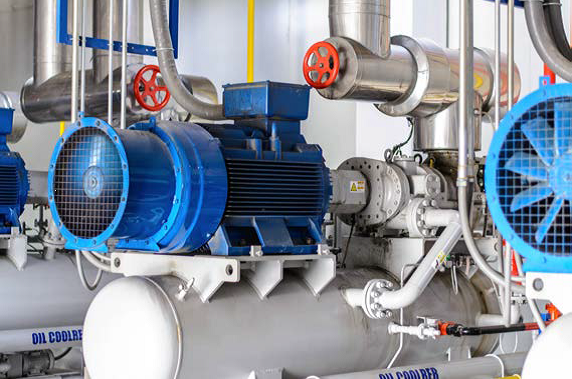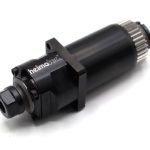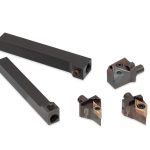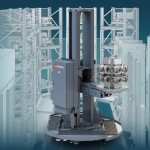VpCI-649 BD Metal Surface Protection
VpCI-649 BD Metal Surface Protection
Cortec VpCI-649 BD combines contact and vapor-phase corrosion inhibitors to protect metal surfaces in direct contact with the treated fluid, as well as those areas above the level of the fluid where the contact inhibitor cannot reach. As the inhibitor flows along in the liquid stream, it releases a corrosion inhibiting vapor that adsorbs and forms a protective layer on exposed metal surfaces above the level of the fluid.

Corrosion is a common threat to closed-loop cooling systems, requiring the addition of a corrosion inhibitor to preserve metal internals. Scale buildup can reduce system efficiency. Another problem is odor produced by bacteria
that naturally grow inside the closed loop. A unique liquid concentrate formulation developed by Cortec Corp. addresses all three problems in closed-loop systems and many other water to metal applications.
Cortec VpCI-649 BD combines contact and vapor-phase corrosion inhibitors to protect metal surfaces in direct contact with the treated fluid, as well as those areas above the level of the fluid where the contact inhibitor cannot reach. As the inhibitor flows along in the liquid stream, it releases a corrosion inhibiting vapor that adsorbs and forms a protective layer on exposed metal surfaces above the level of the fluid.
Unlike a number of traditional closed-loop inhibitors, VpCI-649 BD does not rely on nitrite, phosphate, chromate, or heavy metals to inhibit corrosion. VpCI-649 BD also contains an acrylic polymer to prevent scale formation
and an organic odor-control agent to minimize odor from the growth of bacteria inside the closed loop.
VpCI-649 BD is designed to provide long-term protection for ferrous and nonferrous metals (steel, copper, galvanized steel, and aluminum) in fresh water, steam, and glycol closed-loop systems. However, it is not limited to these uses and is effective at stopping aggressive corrosion in a broad range of applications:
• Closed-loop cooling systems
• Cooling system lay-up
• Hydrostatic testing of pressurized vessels and pipelines
• Packer fluid additive
• Fire extinguishing systems
• Oil storage tanks
For operational closed loop cooling systems, VpCI-649 BD can be easily applied starting at doses of 2,500-3,000 ppm (0.25-0.3%). The liquid is readily watersoluble and its effectiveness at low concentrations provides economical treatment. The presence and concentration of VpCI-649 BD in the treated water can be monitored via molybdate tracer, pH, or refractometer.
When a cooling system is laid up, often for a temporary seasonal change, an important goal is to keep the
equipment in good condition, corrosion-free, until the next season. Otherwise, corrosion products can lead to clogging of the system and lost efficiency. When wet lay-up is desired to allow for a quick restart of the system, VpCI-649 BD can be added at a concentration of 0.5% by volume to provide up to 6 months of protection.
Hydrostatic testing is another time when the flushing of liquid through pipelines or into pressurized vessels leaves behind dampened surfaces at risk for corrosion. Adding VpCI-649 BD to the hydrostatic testing water will provide
protection both during testing and also for a considerable time afterward. Again, a small concentration of 0.5-2% by weight is typically effective.
Other applications that stand to benefit from VpCI-649 BD are packer fluids and fire extinguishing systems. For the former, VpCI-649 BD can be used as a packer fluid additive to protect wellbore casing and tubing walls from corrosion and to provide odor control in regard to microbiological activity. In the case of fire extinguishing systems, sprinkler lines and standpipe systems often undergo initial or periodic hydrostatic testing to check for piping
leaks or failures. Unfortunately, the damp environment created by hydrostatic testing could lead to corrosion and future leakage or clogging when the fire extinguishing system is actually needed. Including VpCI-649 BD in hydrostatic test water can help systems avoid significant corrosion failures like these.
Oil storage tanks commonly experience water-bottom corrosion when moisture condenses at the top of the
tank and then settles to the bottom of the tank, fostering corrosion that may result in tank leakage. VpCI-649 BD can be added to the tank at a low dose to prevent this widespread problem.
VpCI-649 BD is a suitable choice for many corrosive situations where metals are heavily exposed to fluids and where odor-producing bacteria grow. VpCI-649 BD provides triple action by reducing scale, creating a protective layer against corrosion on metal surfaces above and below the fluid, and performing odor-control. With its broad range of use and effectiveness at low concentrations, a little goes a long way for fighting corrosion and odor in closed loops, pipes and tanks.





